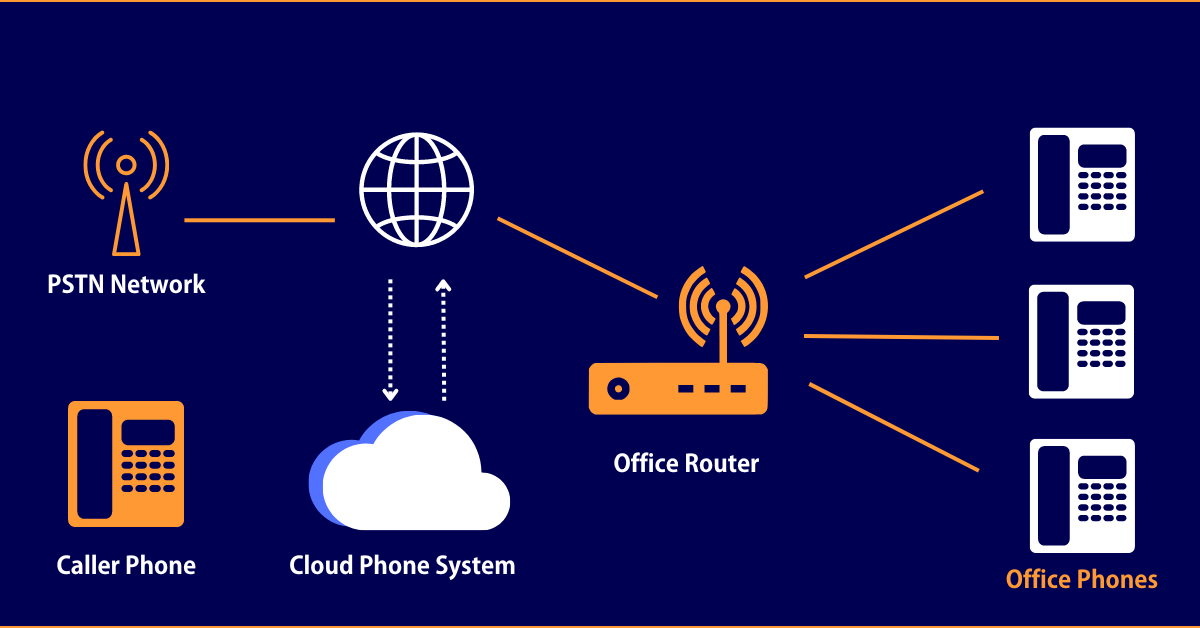Your Next Generation Cloud Business Phone System

4 min read
When customers call, they want someone to answer quickly, preferably a real person. As a busy businessperson, you need to be easy to reach and have the right tools to help you.
But it’s also important not to rely too much on digital tools and lose the personal touch. That’s why using the support of cloud business phone service providers can be a good idea.
Whether you are a small startup or a large enterprise, having an efficient and reliable phone system is essential for staying connected with clients, customers, and colleagues.
With the advent of technology, traditional phone systems are becoming outdat and are gradually being replaced by more flexible alternatives. One such solution is the cloud-based phone system.
What Is a Cloud-Based Phone System?
It is also known as a Voice over Internet Protocol phone system, a modern communication solution that uses the internet to make and receive phone calls, rather than relying on traditional telephone lines.
In this setup, the phone system is hosted and operated by a third-party service provider in the cloud, making it accessible from anywhere with an internet connection. This technology has revolutionized the way businesses handle their communication needs.
How Does It Work?
Cloud-based business phone systems can connect to regular phones through a special method called SIP Trunking. They work with carriers to link to the traditional phone network. It helps to make and receive calls even if they’re not connecting directly to the internet.
Understanding how business phone features are essential to appreciate its advantages fully. Here, we will see the components and processes involved:
Internet Connection: To use a business phone system, you need a stable and high-speed internet connection. This connection serves as the medium for transmitting voice data.
VoIP Phones: Users can make and receive calls using VoIP phones, which are hardware devices specifically designed for VoIP communication. Alternatively software applications can be installed on computers, tablets, or smartphones to facilitate voice and video calls over the internet.
Cloud Server: The service provider hosts the phone system on their servers located in data centers across various geographic regions. These servers handle call routing, call management, and voicemail services.
User Accounts: Each user is assigned a unique login and extension number, allowing them to access the phone system and make calls from their devices.
Call Routing: Calls are routed through the internet to the cloud server, where they are then directed to the intended recipient based on the dialed number or extension.
Features and Functions: Business Phone Services come equipped with a wide range of features, including call forwarding, voicemail, call recording, auto-attendants, and more.
Call Quality: The quality of calls on a cloud-based phone system largely depends on the internet connection’s speed and reliability. In most cases, the call quality is comparable to or even better than traditional phone systems.
Why Use a Cloud Business Phone System?
Now that we’ve covered the basics of how a system operates, let’s go through the reasons why businesses are increasingly opting for this technology:
1. Cost Efficiency
One of the most significant advantages of using a cloud phone system is cost savings. Traditional phone systems require expensive infrastructure, ongoing maintenance, and long distance call charges. In contrast, cloud business phone service providers typically offer more predictable and budget-friendly pricing models. Many providers offer flat-rate or per-user pricing, eliminating surprise bills.
2. Remote Work and Mobility
Cloud phone systems enable employees to make and receive calls from anywhere with an internet connection. This flexibility enhances productivity and ensures that your team can stay connected, whether they are in the office, at home, or on the go.
3. Advanced Features
Cloud phone systems come with a plethora of advanced features that can enhance your business communication. Features such as call recording, voicemail-to-email transcription, auto-attendants, and integration with other business software (like CRM systems) can significantly improve efficiency and customer service.
4. Redundancy
Most reputable cloud phone system providers offer redundancy and failover options. This means that even in the event of a server failure or network issue, your business can continue to make and receive calls without disruption. This level of reliability is challenging to achieve with traditional phone systems.
5. Easy Maintenance and Updates
The service provider handles maintenance and updates for a cloud phone system. This eliminates the need for in-house IT staff to manage and maintain the phone system, saving time and resources for your business.
The Pros & Cons
As with any technology, cloud-based phone systems come with both advantages and disadvantages.
Pros:
- Scalability: The ability to easily scale up or down allows businesses to adapt to changing needs without significant expenses.
- Flexibility: Employees can work from anywhere, promoting remote work and enhancing business continuity.
- Advanced Features: Access to a wide range of advanced features improves communication and productivity.
- Reliability: Redundancy and failover options ensure high availability and minimal downtime.
- Maintenance-Free: Service providers handle maintenance and updates, reducing the burden on IT staff.
Cons:
- Internet Dependency: A stable and high-speed internet connection is crucial for reliable phone service.
- Limited Control: Businesses have less control over the infrastructure and may be reliant on the service provider for certain aspects of their phone system.
- Initial Setup: Transitioning from a traditional phone system to a cloud-based one may require some initial setup and training.
How to Evaluate a Cloud Business Phone System?
Choosing the right cloud phone system for your business involves careful consideration and evaluation. Here are the same factors to consider when making your decision:
- Call Quality: Ask for references or conduct tests to assess call quality. A reliable internet connection is crucial for clear and uninterrupted communication.
- Features and Integration: Determine which features are essential for your business and ensure that the cloud phone system can provide them. Consider integrating capabilities with other business software, such as CRM systems.
- Support and Customer Service: Check the level of customer support provided by the service provider. Having helpful and smart support is really important when you run into problems.
- Security: Inquire about the security measures in place to protect your communication data. Data encryption, access controls, and compliance with industry standards are essential considerations.
- Scalability: Ensure that the cloud phone system can grow with your business. It should be easy to add or remove users and features as needed.
- User-Friendly Interface: A user-friendly interface and intuitive administrative tools can make it easier for your team to manage the phone system efficiently.
- Contracts and Service Level Agreements (SLAs): Read and understand the terms of the contract and SLA offered by the provider. Pay attention to any service guarantees and support response times.
Conclusion
The business communication services offer numerous advantages, including cost efficiency, flexibility, and advanced features, making it an attractive option for businesses of all sizes.
However, it’s essential to carefully evaluate potential providers based on reliability, call quality, features, pricing, and support to ensure that you choose a system that meets your specific needs.
With the right cloud phone system in place, your business can enjoy efficient communication, adapt to changing work environments, and stay competitive in the modern business world.
Make It Easy for Customers to Reach You. Your Next Generation Cloud Business Phone System
Get Professional. Switch Now!
Published: February 26th, 2021
Subscribe to Our Latest Updates
Get monthly product and feature updates, the latest industry news, and more!






